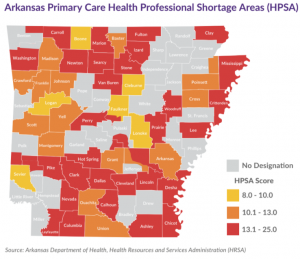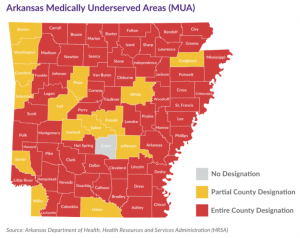By Caleb Taylor
How can Arkansas improve its health and access to medical care throughout the state?
In “Addressing Arkansas’s Health Services Shortages By Empowering Nurse Practitioners” by UCA Associate Professor and ACRE Director Dr. David Mitchell, notes that Arkansas doesn’t have enough primary care health service providers to keep up with demand.
HPSAs are geographic areas of populations that lack enough health care providers to meet the health care needs of that population, according to the Centers for Medicare and Medicaid Services (CMS).
Mitchell writes:
This shortage makes it difficult for patients to see health service providers and manage chronic conditions. Rural patients, people on Medicaid, and children in ARKids are especially vulnerable.”
Medically Underserved Areas are areas or populations designated by the Health Resources and Services Administration (HRSA) as having too few primary care providers, high infant mortality, high poverty, or a high elderly population.
Mitchell recommends improving access to care by (1) allowing nurse practitioners to be designated primary care providers (PCP) for Medicaid and ARKids patients, and (2) expanding the use of nurse practitioners by allowing them to work without state required collaborative practice agreements.
Mitchell writes:
Twenty-two states and the District of Columbia allow nurse practitioners to practice and prescribe without mandated physician collaboration or supervision, and for good reasons. Collaborative practice agreements are costly in multiple ways and the best academic research suggests that the outcomes for patients are the same or better. A recent study found that nurse practitioners in Florida paid an average of $1,048 per month to collaborating physicians. That’s over $12,000 a year out of nurse practitioners’ pockets. They also cost nurse practitioners and collaborating physicians time documenting administrative requirements. For physicians, collaborative practice agreements can make their insurance more expensive. Nurse practitioners are particularly vulnerable to the threat and reality of physicians cancelling agreements and this may dissuade them from making them or expanding their practices.”
You can read the rest of “Addressing Arkansas’s Health Services Shortages By Empowering Nurse Practitioners” here.
Arkansas legislators have previously considered removing this collaborative practice restriction for nurse practitioners.
ACRE Director and UCA Associate Professor of Economics Dr. David Mitchell spoke before both the House and Senate Public Health, Welfare, and Labor committees on February 20 and February 26, 2019 about the need for increased scope of practice for nurse practitioners in Arkansas.
Members of the Senate Public Health, Welfare and Labor committee considered Senate Bill 189 sponsored by Senator Dave Wallace. You can watch the livestream of the committee meeting here. Members of the House Public Health, Welfare and Labor committee considered House Bill 1282 sponsored by Representative Robin Lundstrum. You can watch the livestream of the committee meeting here.
Both bills failed narrowly in committee, but this legislation will likely be deliberated on again in the current legislative session in 2021.
For more of ACRE’s research on nurse practitioners, check out our labor market regulation page.
Mitchell is also the co-author with Jordan Pfaff and Zachary Helms of an ACRE Policy Brief entitled “Solving Arkansas’s Primary Care Problems by Empowering Nurse Practitioners.”



